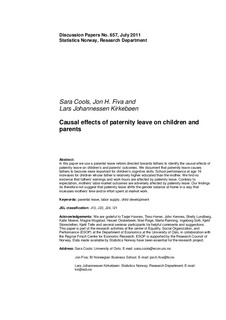Causal effects of paternity on children and parents
Working paper

Åpne
Permanent lenke
http://hdl.handle.net/11250/180309Utgivelsesdato
2011Metadata
Vis full innførselSamlinger
- Discussion Papers [1002]
Sammendrag
Abstract:
In this paper we use a parental leave reform directed towards fathers to identify the causal effects of
paternity leave on children's and parents' outcomes. We document that paternity leave causes
fathers to become more important for children's cognitive skills. School performance at age 16
increases for children whose father is relatively higher educated than the mother. We find no
evidence that fathers' earnings and work hours are affected by paternity leave. Contrary to
expectation, mothers' labor market outcomes are adversely affected by paternity leave. Our findings
do therefore not suggest that paternity leave shifts the gender balance at home in a way that
increases mothers' time and/or effort spent at market work.
Keywords: parental leave, labor supply, child development.
Beskrivelse
This paper is part of the research activities at the center of Equality, Social Organization, and
Performance (ESOP) at the Department of Economics at the University of Oslo, in collaboration with
the Ragnar Frisch Centre for Economic Research. ESOP is supported by the Research Council of
Norway. Data made available by Statistics Norway have been essential for the research project.